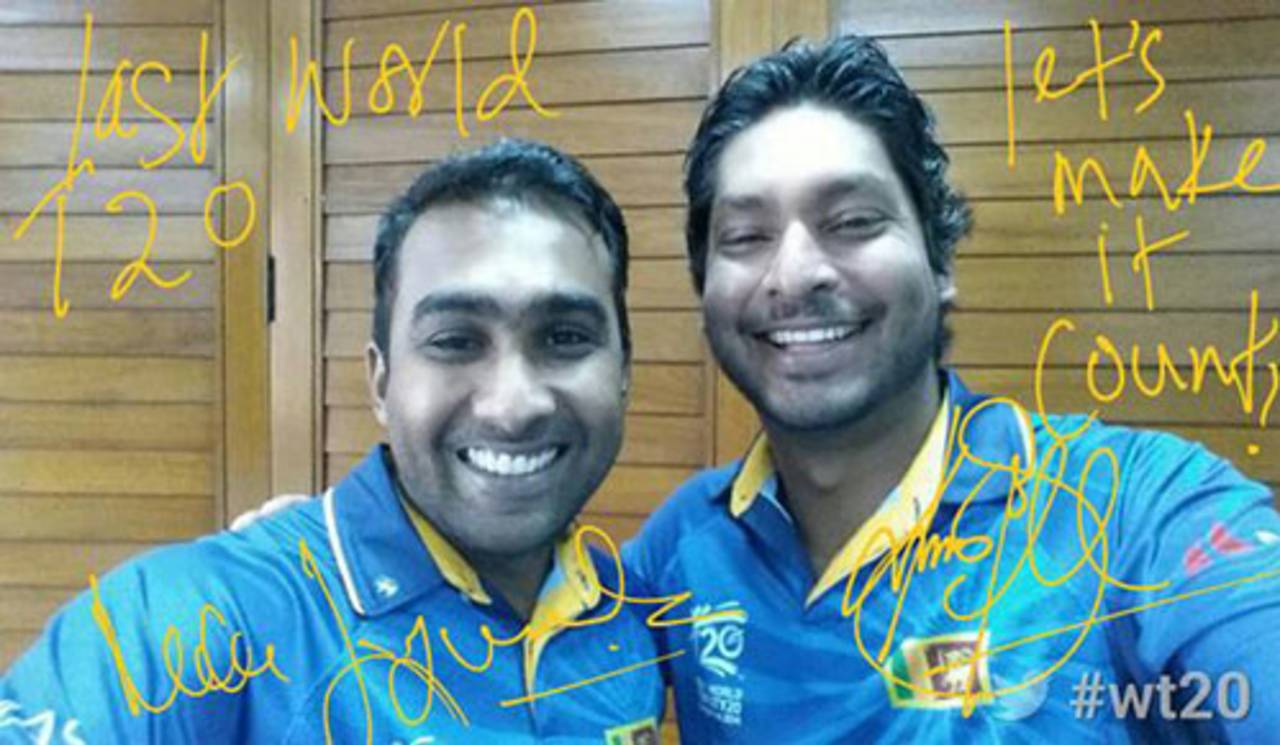The weary middle age of cricket
On the field the action is youthful and thrilling, but off it, there's depressing self-interest, with each board trying to outdo the other in incompetence and venality
Dave Hawksworth
17-Apr-2014

Mahela Jayawardene and Kumar Sangakkara bring joy to millions of Sri Lankan fans but are constantly let down by their own board • ICC/Twitter
For those cricket watchers who take a cynical view of the world game - one that regards the various national governing bodies as spanning a wide spectrum of (in)competence and being motivated more by self-interest than an overwhelming deference towards the greater good - 2014 is shaping up to be quite the year of affirmation. For all the success of the recent World T20, and despite the television riches that continue to flow into the game, the last few months have seen a series of headlines that are doing a stand-up job of validating every ounce of world-weary cynicism you could aim at cricket governance.
There have been officials from Zimbabwe Cricket accused of mismanaging funds from a multi-million dollar ICC loan, while they oversee a debt burden that has resulted in a player strike over unpaid wages, a cancelled tour by Sri Lanka, and the likelihood that one of the country's five domestic teams will have to be disbanded to cut costs.
Players have been urged to boycott the Bangladesh Premier League after wages there haven't been fully paid from the previous year's competition, despite them being underwritten by the national board.
The game in America is so dominated by infighting that the USA Cricket Association spends almost twice as much in legal fees as it earns in revenue.
Sri Lanka Cricket, another board that is heavily in debt, can barely allow itself 48 hours to celebrate winning a World Cup before falling out with two of the team's most loyal servants.
At least the ECB waited four years before sacking the batsman who led them to triumph in the same competition, although the exact thinking behind the decision to drop Kevin Pietersen remains shrouded in mystery, which, in his case, comes in the form of a mutually binding confidentiality clause. It's a situation that further alienates supporters from a hierarchy who can produce a 70-page tour cookbook but whose efforts to communicate their reasoning for dropping a world-class batsman from an underperforming side could fit comfortably on the back of a restaurant napkin.
And just to prove that it continues to dominate almost every aspect of cricket, the BCCI remains the undisputed heavyweight champion of bad press. The IPL might be the driving force behind the increased revenues and widening appeal of T20, but it also remains dogged by accusations of corruption, match-fixing and conflict of interest. In a country famous for its film industry, cricket has turned into the biggest drama in town - a soap opera where the Supreme Court of India is playing an increasingly central role.
It's against that background that the BCCI, ECB and Cricket Australia have decided the need for better governance can be best solved by concentrating the power of the ICC into their hands and that running world cricket really isn't something the other national boards need to worry their pretty little heads about.
It's an alliance that, from the point of view of the participants, makes a lot of sense - the BCCI has the financial muscle to mould world cricket as it sees fit; England and Australia have a wealth of experience in doing exactly that, with apparently no moral aversion in enabling India to follow their lead.
For most of the remaining national boards a power grab by the so-called "big three" is little shy of a fait accompli, given any resistance to it would endanger finances heavily reliant on the largesse of India's touring schedule. Dissent has instead largely come from the media, with this year's Wisden leading the way.
For ordinary supporters that sort of cricket politics can seem dry and uninteresting, but there remains an underlying disquiet over how the game is run. Talk to fans on the internet and, regardless of nationality, they are deeply cynical about how cricket is administered.
It's a paradox that cricket still manages to get so much right on the field. Yet there have been some fantastic Test matches played over the last six months and some brilliant performances in the recent World T20. Watching the raw pace and determination of Dale Steyn during that competition, I was transported back to my teenage years, sitting in the stands at Headingley as Malcolm Marshall ran through the England side.
But read the litany of headlines about corruption, financial ineptitude and player mismanagement that have already been created this year and I'm back through the decades again to my cynical, world-weary middle age. A time where my beard is turning grey, I've no idea what format I'm supposed to buy music on anymore, and world cricket's governance looks increasingly like it's dominated by incompetence and self-interest.
Dave Hawksworth has never sat in a press box or charged a match programme to expenses